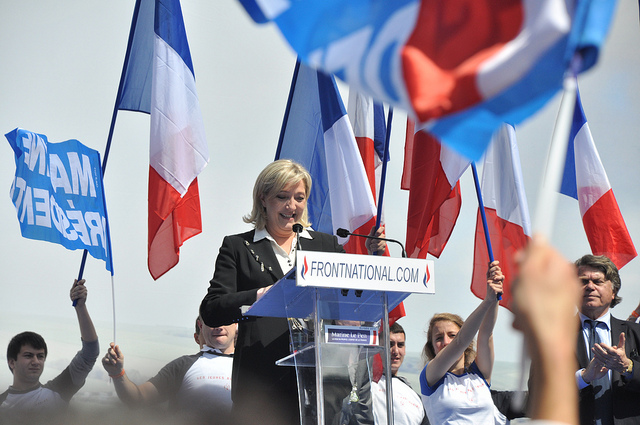Please support our coverage of democratic movements and become a monthly supporter of rabble.ca.
A plague of extreme right-wing parties has struck Europe, as evidenced by results of the recent European Union Parliamentary elections.
The extreme right prevailed in France, Great Britain and Denmark, EU countries that have largely escaped the economic disease that afflicted the PIGS (Portugal, Ireland, Greece, Spain): soaring unemployment, sovereign debt crises, imposed austerity.
The countries harder hit by the economic crisis, Greece, Spain and Ireland in particular, voted in greater numbers for left-wing alternatives than for the extreme right.
The victories of the right are better explained by deep-seated disaffection than by economic distress. Large parts of the population are voting to withdraw their consent to how they are being ruled. The EU election results should make democrats anywhere uneasy.
The first object of rejection is Europe and EU “governance,” which substitutes itself for national rule. Here the extreme right profit from the indifference of national governments to the European project.
The EU has been focused on building a neoliberal space, being a friendly host to multinational corporations, as if it were an instrument of American international economic policy, much like the WTO or the IMF. The idea that market liberalism imposed by European treaty would produce enough riches to go around has proven not to be enough to satisfy national electorates.
The extreme right brandish national identity as a badge of honour. The national “we” is intended to exclude migrants from other EU countries who have the right to work across the Union, immigrants from former colonial territories, and religious minorities, especially Muslims, from taking a prominent role in public life.
The extreme right voters’ rejection of politics as usual cannot be dismissed as a message failure, correctible by a better communications effort, as mainstream parties like to suggest when things go against them. Rather than address directly the national identity issues raised by the extreme right, the mainstream parties believed denouncing them as extremist would be enough.
The strategy of demonizing the French extreme right, the National Front led by Marine Le Pen, and the United Kingdom Independence Party, failed in both countries, as each extreme right party led the polls. It is not enough to ask — what sane individual wants to celebrate anti-immigrant parties, religious in their fervour, exhibiting racist and/or anti-Islamist tendencies, and reminiscent of fascism in their glorification of the nation — and then expect the extreme right voting bloc to disappear.
Now in light of its enhanced support, the hope is the extreme right can be “banalized,” tamed by attention, and voter-given legitimacy. Just as the demonizing strategy failed, for much of the same reasons, banalizing is likely to fail as well.
The extreme right feeds on popular sentiments, strong emotions, and plays to ignorance and suspicions of “others.” At heart the extreme right is anti-Enlightenment; it equates appeals to reason with elites deciding things in their own interest. More and better political education may be needed, but is not about to transform the new political landscape.
Commentators such as Alain Finkielkraut, a leading French intellectual, blame the left for not championing issues such as the separation of church and state (code for keeping Islamists in their place), and allowing the National Front to flourish. Without going as far in legitimizing its concerns as Finkielkraut (himself an exponent of protecting French identity) it is clear that the National Front excites a sense of (false) injustice that has not been addressed by the mainstream parties, or properly countered.
The French Gaullist party (UMP), traditionally the major force on the right, is tearing itself apart over how to respond to the success of the extreme right which of course undermines its own position as champion of private property rights, and all things dear to the right. Should the UMP keep its distance from the racist National Front, and risk electoral failure, or should it attempt to form alliances of convenience with it to defeat the left?
Modern movements of the right first arose in France after the 1789 revolution. People supportive of the monarchy and the return to power of the aristocracy worked to oppose the revolutionaries who had overthrown the ruling feudal class.
Traditionally in democratic politics, the right represented the established order, while the left incarnated the forces for change. The right supported the church, the army, the banks, and hereditary rights to property. The left wanted workers to possess the fruits of their labour, and enjoy economic and social security. It drew its working-class politics from the Enlightenment: reason was to prevail in public affairs.
In its current version the European extreme right represents the Europe of peoples, not the Europe of democracies. The threat it poses is serious because European democracy is weak, and getting weaker as optimistic spirits wane.
Mainstream parties of the left and right now will look to forming national coalitions to minimize the impact of extreme right parties on national and European policies. A more real sense of European citizenship is needed for democracy to prevail over sentiments of lost identity.
Duncan Cameron is the president of rabble.ca and writes a weekly column on politics and current affairs.
Photo: Marine Le Pen. Credit: Blandine Le Cain/flickr




